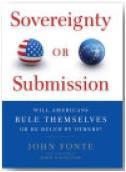|
|
|
Secretary of Defense Leon Panetta left Senator Jeff Sessions (R-AL) nearly "breathless" during a March congressional hearing when he said that the Obama administration would seek "international permission" from NATO or the United Nations (UN)-- and not from the U.S. Congress -- before involving the U.S. in Syria's civil war. One person who was likely not surprised by Panetta's admission is John Fonte, author of a very important book titled Sovereignty or Submission. Dr. Fonte lays out the very real threat to American democracy posed by the global governance movement. The goal of globalists is to extend the "shared" sovereignty exemplified by the European Union to the rest of the world -- but especially to the United States. What does "shared" sovereignty look like? European Union senior diplomat Robert Cooper colorfully describes the EU as "a highly developed system for mutual interference in each other's domestic affairs, right down to beer and sausages," not to mention monetary policy and debt. If the globalists can entangle the U.S. in a morass of transnational standards, bureaucratic regulations and legal institutions, then America's military independence can be undermined and our domestic policies can eventually be made to reflect progressive European norms. For example, the UN committee monitoring the Convention on the Elimination of All Forms of Racial Discrimination has already told the United States to overturn the First Amendment because it is an obstacle to outlawing hate speech. If it sounds far-fetched to imagine that the United States would cede self-rule to foreigners, then consider that five Supreme Court justices have already cited foreign laws -- and treaties the United States has not even ratified -- to justify their decisions. Harold Koh, top legal advisor to the U.S. Department of State, is an open advocate for a transnational judicial system. He advises the Obama administration on how to implement international treaties, and insists that U.S. courts should coordinate "constitutional rules with rules of foreign and international law." Other American globalists include leftwing foundations and NGOs that work with the United Nations to promote a progressive agenda they can't achieve by democratic means. Transnationalists do face formidable obstacles, however; non-democratic nations like China, Russia, Iran and North Korea will never concede to the constraints of global governance. And ideological opponents who favor sovereign nation-states have yet to exploit the movement's Achilles' heel, which is a clear lack of democratic accountability. If Americans understand that the very foundation of the republic -- the consent of the governed -- will be ceded to an unelected, unaccountable bureaucracy with no democratic means for change or appeal, they will roundly reject politicians with a globalist agenda. Reading and sharing Sovereignty or Submission is a great way to get the word out. (Encounter Books, 2011, 449 pp., $25.95) |
 The movement uses various code words, including transnationalism, globalization, universal jurisdiction and "evolving norms of international law." What all these words mean is that the U.S. Constitution would be inferior to global elite dictates on everything from when we can declare war to domestic issues such as immigration, budget priorities and family law.
The movement uses various code words, including transnationalism, globalization, universal jurisdiction and "evolving norms of international law." What all these words mean is that the U.S. Constitution would be inferior to global elite dictates on everything from when we can declare war to domestic issues such as immigration, budget priorities and family law.

